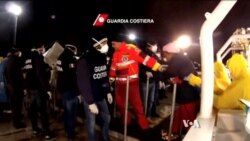In temperatures close to freezing and waves eight meters high, the Italian coast guard took the migrants on board their small patrol vessels.
While some are thought to have died when their inflatable boat capsized in extreme weather off the coast of Libya on Sunday, at least 29 more succumbed to hypothermia after 18 hours on the open-deck rescue boats.
As the coast guard vessels reached the Italian island of Lampedusa early Monday, body bags were loaded onto the dock in a grimly familiar sequence of events.
While the latest deaths have prompted renewed calls for humanitarian patrols across the Mediterranean, the European Union is divided over whether such large-scale search-and-rescue patrols encourage more migrants to risk their lives at sea.
Last year’s controversial closure of Mare Nostrum, an Italian naval search-and-rescue mission, prompted some human rights groups to object, saying that shuttering the program in favor of smaller-scale, EU-run Operation Triton, would endanger lives.
"Mare Nostrum was an emergency solution to a humanitarian crisis, so closing it was a huge and intolerable step backward," Lampedusa Mayor Giusi Nicolini recently told Reuters.
"The small patrol boats were completely swallowed by the waves during the trip back," he said of this week's tragedy, which saw an unusually large number of fatalities occur after the initial rescue. "If Mare Nostrum were still going, the migrants would have been given shelter inside a large ship within an hour."
While the EU's Operation Triton has fewer vessels and keeps patrols close to the European shoreline, Izabella Cooper of the EU's Frontex border agency said imperiled migrants could still be rescued beyond EU maritime boundaries.
“Most of the situations that we have been seeing here require immediate provision of search and rescue. And of course if such a situation emerges, we will go even beyond our operational area to save human lives,” she said.
But with fewer resources at its disposal, Cooper added, it is impossible for Operation Triton to patrol the entire Mediterranean Sea.
“It is over two-and-a-half million square kilometers large, so it is extremely difficult, if not impossible, to have a full overview of what is happening there," she said. "The more migrants come, the more difficult it will be to detect smaller boats and rescue them. So it is a very concerning situation indeed.”
A record 170,000 irregular migrants crossed the Mediterranean into Europe in 2014, one quarter of them were Syrian. More than 3,000 died on the journey.
In recent months smugglers have employed a new tactic, packing aging cargo vessels full of hundreds of migrants. Last month the ship "Ezadeen" was detected drifting off the coast of Italy. On board were 450 Syrian refugees who had paid up to $6,000 each for the journey.
Captain Einar Valsson was commander of the Icelandic vessel sent to rescue the ship.
“When you are in reality and see it, it was an amazing sight, and the first thought when we saw it [was], ‘How are we going to make this operation work?’”
Members of the Icelandic crew, aided by the Italian coast guard, were winched aboard the Ezadeen before it was towed to Italy.
The rate of migrant arrivals this year is outpacing 2014, and EU officials says the unrest in Libya means migrants are no longer able to use the country as a layover before leaving for Europe.
“Only an integrated approach could address this problem," said Cooper of Frontex. "You have to stabilize the countries from which the migrants are fleeing, but you also need to adopt a common European approach, a common European policy on immigration and asylum.”
The United Nations refugee agency says 160,000 people made the sea crossing to Italy between January and November 2014 and a further 40,000 landed in Greece. Thousands have died attempting the journey.
Portions of this report are from Reuters.





